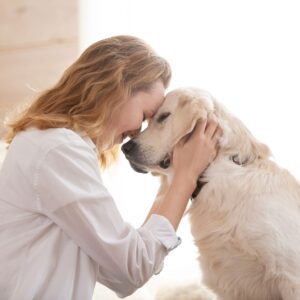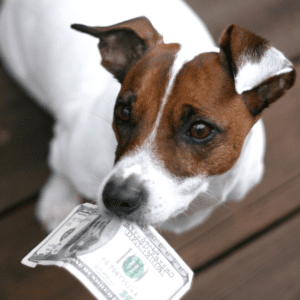An excessively barky dog can (literally!) be a real headache for dog owners.
Although some breeds are certainly considered more ‘chatty’ than others, barking is a completely normal communication channel for our dogs, and so it’s unlikely that it can ever stop altogether.
However, if you think your dog is barking excessively, or for long periods of time, there are some steps you can take to get things under control.
First and foremost, you need to determine why your dog is barking. Of course, this is easier said than done, but perhaps start by thinking about
- What could be triggering them?
- Is it at a certain time of day?
- Is my dog frightened/anxious when they bark?
Generally, dogs bark at us to tell us they need something, are excited, frustrated or frightened. Once you can determine what sets your dog off, you can start to work on getting this under control.
I know the trigger!
If you can determine a single trigger, the easiest thing to do here is completely remove it, if possible. For instance, if it’s people walking past the window that sets them off, you could install some curtains or blinds, or keep your dog shut off from this room.
If removing the trigger is not possible, training is needed to form a distraction. A simple cue such as ‘bed’ would be sufficient here. Start reinforcing this by throwing treats into your dogs bed whilst saying the cue you wish to use. Repeat over and over and over… and over!! Ideally, you want to be able to use the cue before they begin barking but again, this is not always possible but the earlier the better (so have treats within easy reach at all times!)
Don’t worry, this is not a way of rewarding your dog for barking at people walking past the window. You are actually rewarding him for completing the job you asked him to do, which is to get into their safe space.
It’s around X o’clock everyday…
If there doesn’t appear to be a single trigger for your dogs barking, perhaps you’ve noticed a pattern in when they bark. Perhaps it’s first thing in the morning after a good old sleep? Or is it when you get home from work after they’ve had a few hours by themselves?
Regardless of the exact time, it would appear that they are trying to tell you they are frustrated. Most likely boredom and/or in need of exercise.
The easiest answer here is to keep your dog sufficiently exercised and you may even need to increase the amount of exercise you’re giving your pooch. A wise person once said ‘a tired dog is a happy dog’, and there’s a lot of merit in this.
This may be tricky to do with a full schedule, so perhaps consider a dog walker a few days a week or even a doggy day care. Being with other dogs is stimulating both physically and mentally and can almost guarantee a much more relaxed pooch at the end of the day.
If this is not an option, time to look at some super fun toys. Licky Mats are a great way to entertain your dog – simply cover it with something yummy (doggy peanut butter, wet food, sardines in tomato sauce) and let your dog spend their time and energy licking up every last morsel. You can even stick this in the freezer first for prolonged licking!
Another fun and very cheap (but messy) way to offer your dog stimulation is to create a snuffle box out of all of your old recycling. Simply chuck a load of cardboard and paper into a box, scatter treats amongst it all and eat voila – a DIY doggy scavenger hunt.
I think my dog is scared or anxious…
If you are concerned that your dog is barking excessively due to fear or anxiety, you should enlist the help of a qualified behaviourist to get to the bottom of what is going on.
In the meantime, if you know what the scary thing is – take it away! If it’s being alone, avoid this by asking friends or family if your dog can sit with them while you need to go out or book into a doggy daycare. If it’s other dogs on walks, perhaps change your walk time or route to ensure your dog isn’t going to come face to face with what scares him.
What not to do!
However, hard or frustrating you must never tell your dog off. By telling your dog off you could be adding to the anxiety or worry and leaving them confused. Additionally, your dog might think that you are actually barking along with him and so this will encourage him to continue to bark.
And you must never ever reward the barking. For example, if your dog is barking for their tea, ignore them wait until they are quiet and then give them their tea. By doing this, you are actually rewarding them for being quiet and so positively reinforcing the behaviours you wish to see.
If you do you have a barky dog, you may be in for a few weeks/months of positively reinforcing them to stop barking. The key to success is to be consistent and although you may find the process frustrating at times just remember it is never too late to train a dog.
For unwanted behaviours, there is no one better qualified than an a professional behaviourist and so if you feel overwhelmed or do not know where to begin, we would urge you to go down this route.
if you think you need a hand with your dog’s barking, use the links provided to find doggy professionals on Wooflinks who will be happy to help.









Add a comment